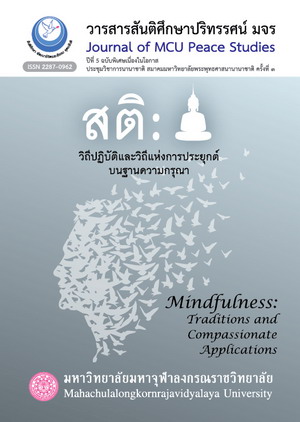An Analytical Study of The Concept of Consciousness in Theravada Buddhist Philosophy
Main Article Content
บทคัดย่อ
The objectives of this thesis were found the follows: 1) to study the consciousness
in general conceptions, 2) to study the concept of consciousness in Theravada Buddhist
Philosophy, and 3) to analyze the concept of consciousness in Theravada Buddhist
Philosophy. The data were mainly collected from the Tipitaka, books, magazines,
documents, commentaries and related research works.
The results of the research were found that:
1. The concept of Viññana in general’s views. 1. In the Eastern concepts found |th
at: Viññana is permanent and unchanging when a body is died it will change to a new
body. And in the Western’s concept that it is movable form, transparent, knowledge
element and eternity.
2. Viññana in Theravada Buddhist Philosophy’s concepts divided into 2 points as
follows. First, Viññana refers to the spiritual life of abstraction, not vanish as a concrete
object. Before moving from a body it will transmit all features to fully a new spirit before
dying. Second, Viññana means “thorough knowledge or consciousness of external
objects”. It refers to sense-awareness resulting from Six-Sense Bases touching with external
objects. Eye’s touch with visible form results in eye-consciousness. Ear’s touch with sound
results in ear-consciousness, etc. All the consciousnesses arise in the process of
Dependent Origination i.e., through condition the consciousness arises. If there is no the
process of Dependent Origination it will not arises.
3. Analysis Viññana in Theravada Buddhist Philosophy found that: All beings have
a spiritual sense, feelings, though a body is lost but it is reborn in the circle of life because
Karma is controls, and a thing has not Viññana such a tree, when it died must vanish.
And Viññana is sense-awareness by doors, such as by eye, by ear, etc. Perception
must depends on working through the senses nervous system. It will act to see or hear,
etc. Because it Dependent Origination will arises.
Article Details
ทัศนะและความคิดเห็นที่ปรากฏในบทความในวารสาร ถือเป็นความรับผิดชอบของผู้เขียนบทความนั้น และไม่ถือเป็นทัศนะและความรับผิดชอบของกองบรรณาธิการ ยินยอมว่าบทความเป็นลิขสิทธิ์ของวารสาร


